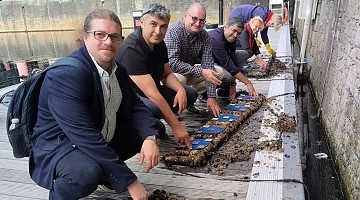Why study this course with LJMU?
- Equips you with a wide range of specialist and transferable skills required by employers related to human biology and health
- Delivered by experts in human biology and related disciplines.
- Engage and learn with subject experts and research-active staff in a welcoming and supportive environment
- Gain experience of using current and cutting-edge laboratory technologies, techniques and tools
- Develop interpersonal and intrapersonal skills required by employers and attend regularly organised employability events and networking opportunities
- Participate in residential courses and work placement opportunities in the UK and abroad to further develop skills and competencies
- This degree is available to study following a foundation year
- International Foundation Year course available offering direct progression onto this degree programme - visit LJMU's International Study Centre to find out more
About your course
The new BSc (Hons) Human Biology provides a deep understanding of the human body, its anatomy and biological processes – from the molecular level to the whole organism, and related hot topics such as health, disease and the impact of ageing on societies.
You will develop an informed and critical understanding of human biology relevant to the public and private sectors, such as academic, health care, clinical and industry. The degree offer the opportunity to develop specialist subject knowledge in one of the following themes through selecting optional modules: genetics, health and disease, nutrition, neuroscience, and microbiology and immunology.
In the second and third years you can specialise by choosing optional modules from a variety of topics. You also have the chance to undertake a short 135 hour work-based learning placement or a year-long industrial placement. This means you can put what you have learnt into practice and acquire transferable skills sought by employers.
Course modules
What you will study on this degree
Further guidance on modules
Modules are designated core or optional in accordance with professional body requirements, as applicable, and LJMU’s Academic Framework Regulations. Whilst you are required to study core modules, optional modules provide you with an element of choice. Their availability may vary and will be subject to meeting minimum student numbers.
Where changes to modules are necessary these will be communicated as appropriate.
Core modules
Core modules
Optional Modules
Core modules
Optional Modules
Your Learning Experience
Excellent facilities and learning resources
We adopt an active blended learning approach, meaning you will experience a combination of face-to-face and online learning during your time at LJMU. This enables you to experience a rich and diverse learning experience and engage fully with your studies.
Teaching is mostly via lectures and in-person laboratory practicals. Additionally, small tutorial sessions provide a forum for discussing course material more informally. You can participate in residential courses and work placement opportunities in the UK and abroad to further develop your skills and competencies You will also have progress review meetings with your personal tutor. Our approach ensures that you can easily access support from your personal tutor, either by meeting them on-campus or via a video call to suit your needs.
Work-related learning
At level 6 you have the opportunity to take a work-based learning module, incorporating 135 hours of work experience. All students are fully supported by a work placement officer. This gives you the opportunity to gain professional exposure in a relevant industry, form networks, enhance your skill set and gain valuable experience that can influence your long-term career goals and provide an employability edge. A work placement can be a refreshing break and provide inspiration for your final year research project.
Dedicated personal tutor, plus study skills support
Throughout your course you will have the support of a personal tutor who will be available to discuss course-related matters in both tutorial sessions and one-to-one progress review meetings. These meetings are to monitor your performance and identify action plans for improvement. A dedicated supervisor will also provide support during your research project.
The school is fully committed to promoting a learning environment that supports a culture of equality, diversity and inclusivity (EDI) and has a Disability Support Coordinator, an EDI Coordinator and a School EDI Working Group. Personal Tutors also play a vital role in promoting awareness of support services for students.
Assessment varies depending on the modules you choose, but will usually include a combination of exams and coursework.
Most modules are assessed by exam and coursework, and some via coursework only. All students perform differently depending on how they are assessed, which is why we use a combination of assessment methods. Exams may therefore include a range of question types e.g. multiple choice, short answer, interpretative, problem-based learning and essay. Coursework assessment could be in the form of phase tests, fieldwork/practical reports, data handling, oral presentations, poster presentations, group discussions, essays or the evaluation of your practical skills. These are based on individual assignments but some require group work.
Feedback on coursework assessments is normally provided within three weeks of submission and may be via Canvas (our virtual learning environment), face-to-face or in writing. We believe that constructive feedback is vital in helping you identify your strengths as well as the areas where you may need to put in more work.
Where you will study
What you can expect from your School
You will study at the Byrom Street site in the university's City Campus in the heart of Liverpool. You will have access to first class teaching facilities, laboratories and study areas. The Avril Robarts library is within easy walking distance and here you'll find all the information you need to support your studies.
Career paths
Completing this BSc Human Biology programme will open up a vast range of career opportunities.
You can develop interpersonal and intrapersonal skills required by employers and attend regularly organised employability events and networking opportunities. Graduates will be equipped with the knowledge and transferable skill set needed for further study and career success in human biology and related health sciences. Human biologists may pursue a variety of careers in the UK and abroad, in areas such as: laboratories, scientific education and communication, public health and policy, technical service and sales support, or health service providers.
Some graduates prefer to continue their studies with postgraduate study (PGCE/PGDE, MSc, MPhil, MRes, or PhD) or pursue careers in teaching and lecturing.
Student Futures - Careers, Employability and Enterprise Service
A wide range of opportunities and support is available to you, within and beyond your course, to ensure our students experience a transformation in their career trajectory. Every undergraduate curriculum includes Future Focus during Level 4, an e-learning resource and workshop designed to help you to develop your talents, passion and purpose.
Every student has access to Careers Zone 24/7, LJMU's suite of online Apps, resources and jobs board via the LJMU Student Futures website.
Tuition fees and funding
The University reserves the right to increase tuition fees in accordance with any changes to the maximum allowable fees set by the UK Parliament. In the event of such a change, any fee increase will be subject to a maximum cap of 10% of the total course cost as originally stated at the time of your offer.
The fees quoted above cover registration, tuition, supervision, assessment and examinations as well as:
- library membership with access to printed, multimedia and digital resources
- access to programme-appropriate software
- library and student IT support
- free on-campus wifi via eduroam
Additional costs
Although not all of the following are compulsory/relevant, you should keep in mind the costs of:
- accommodation and living expenditure
- books (should you wish to have your own copies)
- printing, photocopying and stationery
- PC/laptop (should you prefer to purchase your own for independent study and online learning activities)
- mobile phone/tablet (to access online services)
- field trips (travel and activity costs)
- placements (travel expenses and living costs)
- student visas (international students only)
- study abroad opportunities (travel costs, accommodation, visas and immunisations)
- academic conferences (travel costs)
- professional-body membership
- graduation (gown hire etc)
Funding
There are many ways to fund study for home and international students. From loans to International Scholarships and subject-specific funding, you'll find all of the information you need on our specialist funding pages.
A DBS check is not required for your application, however a DBS may be required for modules where there is a work based learning placement option. Work based learning placements that do not require a DBS check are available.
Entry requirements
Please choose your qualifications below to view requirements
Grades/points required from qualifications: BCC-BBC (104-112)
Work out how many UCAS points your qualifications are worth by visiting the UCAS Tariff Calculator.
Qualification requirements
How to apply
Securing your place at LJMU
UCAS is the official application route for our full-time undergraduate courses. Further information on the UCAS application process can be found here https://www.ljmu.ac.uk/study/undergraduate-students/how-to-apply.
Your university life
From accommodation and academic support to clubs and societies. Find out what LJMU has to offer.
Related Links
Talk to our students
Connect with a current LJMU student for advice and guidance on university life, courses and more.
See what our students are saying
At LJMU we want you to know you're making the right choice by studying with us. You can see what our students are saying about their experience with us through their reviews on the following websites:
Related Links
News and views
Browse through the latest news and stories from the university
The university reserves the right to withdraw or make alterations to a course and facilities if necessary; this may be because such changes are deemed to be beneficial to students, are minor in nature and unlikely to impact negatively upon students or become necessary due to circumstances beyond the control of the university. Where this does happen, the university operates a policy of consultation, advice and support to all enrolled students affected by the proposed change to their course or module.
Further information on the terms and conditions of any offer made, our admissions policy and the complaints and appeals process.

































